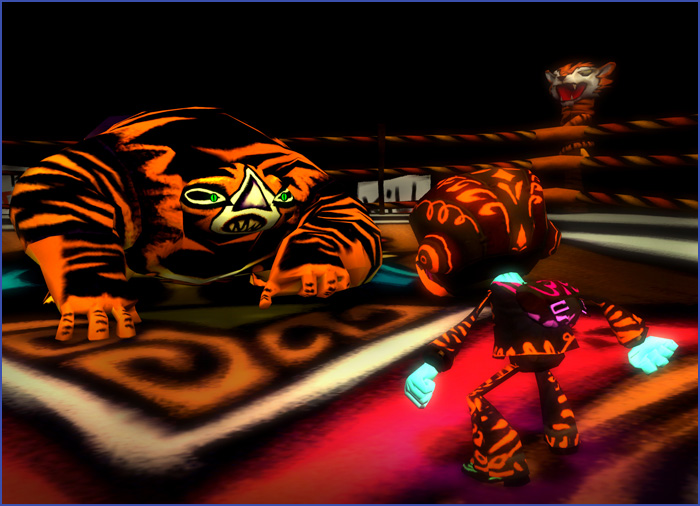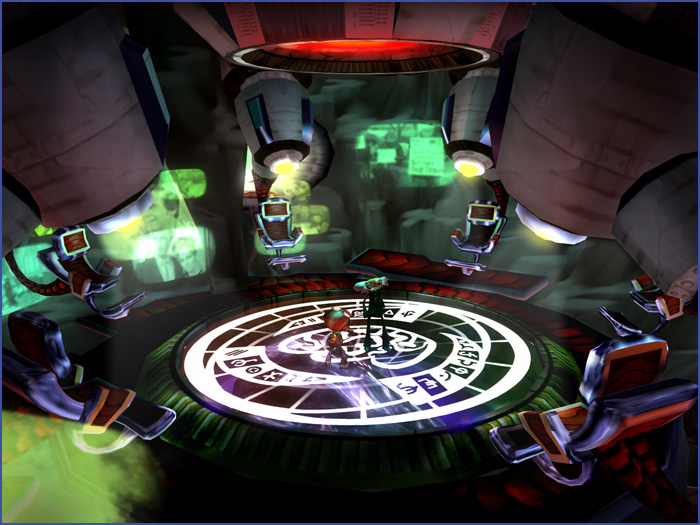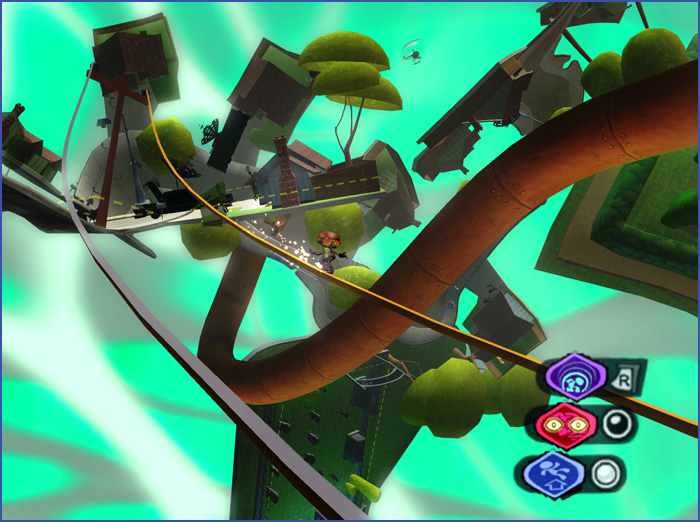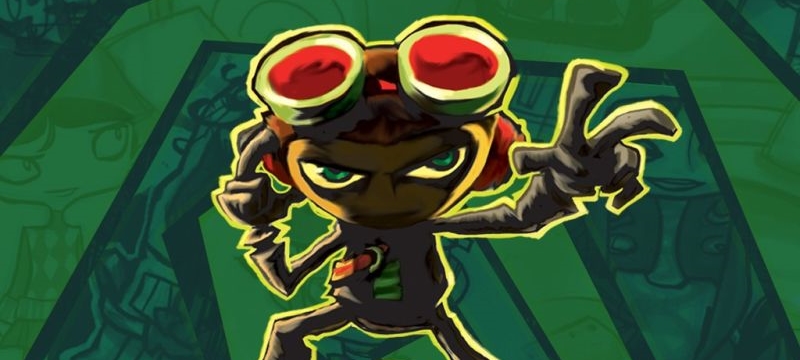This review was originally published on my old blog, Nostalgia for Infinity, in January 2008. I’m republishing it in celebration of DoubleFine’s recent release of Psychonauts 2, a long, long-awaited sequel.
On its original release in mid 2005 – that’s “February 2006” to we lucky few European gamers – Psychonauts rapidly accumulated substantial critical praise. From the lofty perspective of 2008 this is best illustrated by a brief look at some of the awards the game garnered: Eurogamer’s 2005 Game Of The Year, a BAFTA Best Screenplay, Best Writing at the 2006 Game Developers Choice Awards, and a host of awards from Gamespot including Best Voice Acting, Best Original Music and Best Platformer.
Further, Metacritic presently ranks the game with a healthy score of 88 – with only the Detroit Free Press and games(tm) ranking it under 80. It can safely be said that in the eyes of the arbiters of entertainment, Psychonaut was well-received.

Perhaps inevitably, it was a total commercial flop. A month after the US release on Xbox, PC and PS2, publisher Majesco announced a revision of fiscal year projects from $18 million net profit to the same figure net loss, and at the end of the year stated that they were withdrawing from “big budget console” releases. At this time Psychonauts had shifted only 100,000 copies. The figure later quadrupled thanks to European sales and, possibly, an inclusion in the Xbox 360 backwards compatibility list. Several digital distribution releases may also have assisted in the game’s sales, including a release on Steam, but apparently these figures aren’t included in the 400,000 sum. Whatever: the game flopped.
So! Last year it was announced that in December, alongside the upgrade to the Xbox 360 dashboard, original Xbox games would be available for purchase and download over Xbox Live. Strangely, Psychonauts isn’t included in the first announced lists of downloadable classics, although its intended presence was rumoured. Fortunately, on the 4th of December I was able to fork more of my cash into Microsoft’s coffers download and play Psychonauts for the first time.
That early critical acclaim was more than warranted, and I’d go so far as to say that Psychonauts remains as vibrant, witty and entertaining an experience as it must have been in 2005. The quality of the writing is consistently superb, with cracking lines such as “you’re like molasses going uphill in January. …with crutches” and “Honey, I’m off to die for an incompetent leader who won’t even remember my name! You’re in my will.” The voice acting really does the script justice, with Invader Zim’s Richard Steven Horowitz providing the voice of Razputin “Raz” Aquado, the 10-year old protagonist of Psychonauts.

It’s difficult to single out the game’s particular strengths, as ultimately it is such a well-rounded and high quality experience. Something I enjoyed a great deal was the amount of variety in level design, a natural by-product of much of the game being set within the minds of other characters. The plot focuses on Raz, a wannabe psychonaut cadet, who sneaks into a training camp in order to achieve his dream. It doesn’t take too long before a sinister and surreal plot involving the theft of brains (and DEATH TANKS) to emerge. Naturally, Raz is the only one who can save the day – through the acquisition and use of new and more varied psychic powers.
The powers themselves range from the mundane – bolts of energy, setting things on fire – to the slightly less common – telekinesis, clairvoyance, a reflective mental shield – but it is their use as applied in the wildly differing levels of the game that elevates them to something genuinely interesting. Many of the levels introduce a specific new power and explain the basics of their use. The player is then left to figure out how these powers – and those already acquired – should be applied to their environment in order to reach a new area, to defeat a new enemy, or to solve a puzzle. These questions are sometimes easy to answer, sometimes tough, and sometimes a little lateral, but are very rarely frustratingly difficult to answer. This is an impressive achievement given the variation and imagination demonstrated in the scenery, art styles and environments of the game. These range from the literally twisted paranoiac fantasies of “The Milkman Conspiracy” to the gorgeously stylised setting of the appropriately named “Black Velvetopia”. Screenshots don’t do them justice.

If I occasionally found myself irritated by Psychonauts, it was when I was confronted with the game’s toughest platforming components. I have a great aversion to being made to replay segments of a game I have already completed; in one section of the final level there are two consecutive and frustrating sections. There is a checkpoint before them, and after them, but not between; subsequently, my deaths (missing a jump) were split between the two sections despite having passed the first section several times before. To be fair, however, this section primarily sticks in my mind because it is the one point at which I had cause to question – even notice – the checkpointing.
Psychonauts is a great game, and one that has been polished to an exceptional sheen through the application of much love and talent. That it performed so poorly commercially is a crying shame, but it’s fantastic that the game has been given another lease on console life. Play Psychonauts: it’s for you.
Available on? Xbox Live (Xbox 360), or Steam / GameTap (PC).
Available when? Now! (Dec 4th 2007)
Publisher: Majesco (originally)
Developer: Double Fine Productions Cost: 1200 Points (Xbox Live: £10.20 in real monies), $19.95 (Steam)
P.S.: European / PAL gamers be warned: according to Wikipedia “the European marketplace download is not compatible with the VGA cable because the game runs in 50Hz.”

